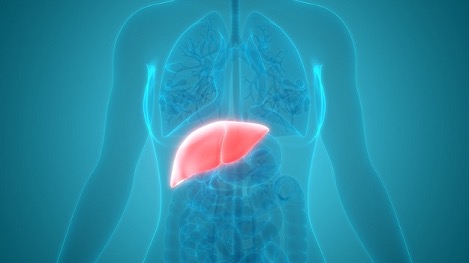Genethon’s Gene Therapy for Rare Liver Disease Shows Promising Early-Stage Results
August 22, 2023
Source: drugdu
 338
338
By Connor Lynch

Pictured: Illustration of a human body with the liver highlighted/iStock, magicmine
Genethon’s experimental gene therapy for treating Crigler-Najjar syndrome, a rare liver disease that causes the toxic buildup of bilirubin, showed promising results in a Phase I/II study published Thursday in The New England Journal of Medicine.
The clinical trial, sponsored by Genethon, brought together researchers from Italy, the Netherlands, and France to study the efficacy and safety of Genethon’s GNT 0003 candidate gene therapy. The drug combines an AAV8 vector with a copy of gene UGT1A1, which is defective in patients with the condition. The goal of the treatment is to restore function of the liver and restore its ability to produce the UGT1A1 enzyme, which is responsible for breaking down bilirubin.
The study examined 17 women aged 21 to 30 years with severe Crigler-Najjar syndrome. According to the results, the drug restored expression of the UGT1A1 gene and reduced bilirubin levels, on average, from 351 μmol/l to 149 μmol/l.
Genethon said Thursday in a press release that the drug “lowered bilirubin levels below the toxic threshold with a single intravenous injection to such an extent that three patients treated with the highest dose have been able to stop using phototherapy for the last 18 months or more.” However, patients who received the lower dose of the drug had exceeded toxic levels of bilirubin by 16 weeks.
The study also supported safety findings for the treatment, with no serious adverse events reported. Headaches and alterations in liver-enzyme levels were the most common adverse events, the latter of which were treated with glucocorticoids.
In Genethon’s Thursday announcement, the company claimed the results are the first clinical demonstration of the efficacy of gene therapy in a metabolic disease of the liver.
The results are encouraging for advancing a potential treatment for a difficult condition. Crigler-Najjar syndrome leads to neurological injury and death, and currently the only treatments are prolonged daily phototherapy, which uses blue LED lights to break down the bilirubin that the body can’t—as well as allogeneic hepatocyte transplantation, essentially a smaller-scale and more targeted liver transplant that only transplants the needed tissues. However, the only cure for the condition is currently a liver transplant.
“Although our study is small, among the patients who received the dose of 5×1012 vg per kilogram, GNT0003 restored UGT1A1 activity to levels that permitted suspension of phototherapy, and the efficacy persisted at 18 months after the treatment,” the study authors wrote, adding that a “test of replication in a larger, well-characterized cohort of patients will be important.”
Genethon is conducting a broader study, started in January, evaluating the efficacy and safety of the treatment in patients aged 10 and older.
“If the results of the pivotal part confirm the efficacy of our gene therapy for Crigler-Najjar syndrome, we will be able to move on to product license application and making the treatment available to patients, providing them with significantly improved quality of life,” Genethon CEO Frederic Revah said in a statement.
Read more on
- Driven by drugs for lowering blood sugar and losing weight, the export value of Chinese Western medicine preparations has reached a record high February 2, 2026
- Chengdu Pioneer and Kangzhe Pharmaceutical have reached a cooperation agreement to leverage the DEL and HAILO platforms to empower the development of multi-target innovative drugs February 2, 2026
- J&J’s subcutaneous monoclonal antibody combination therapy receives further FDA approval; Autoimmune CAR-T therapy granted FDA Breakthrough Therapy Designation February 2, 2026
- Why is the development of AI-based antiviral drugs a niche field yet a necessity? February 1, 2026
- Pakistan issues final antidumping ruling on Chinese cephalosporin February 1, 2026
your submission has already been received.
OK
Subscribe
Please enter a valid Email address!
Submit
The most relevant industry news & insight will be sent to you every two weeks.



